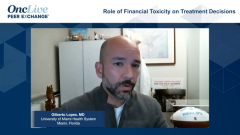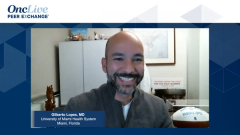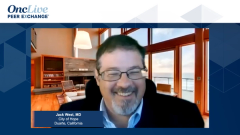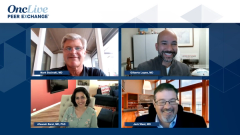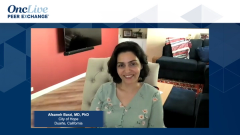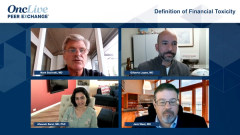
Personalized Therapies Based on Innovation and Affordability
Gilberto Lopes, MD, and Afsaneh Barzi, MD, PhD, discuss personalized treatment plans based on innovative therapies and affordability.
Episodes in this series

Mark Socinski, MD: Afsaneh, let me ask you, if you could wave your magic wand and make all of these therapies generally affordable for everybody, and also keep up the pace of drug development, getting to that holy grail of truly personalized medicine for the patient, what do you think is the most significant barrier to getting there?
Afsaneh Barzi, MD, PhD: I think the ability of Medicare to negotiate prices of therapies with the providers is an important step in that direction. When we look at the countries that have more national health—the United Kingdom, Canada, and other countries in Europe or other parts of the world—they have much lower prices for the drugs. Health care is generally more affordable, and it covers a lower percentage of their GDP [gross domestic product]. I would say that the patients aren’t completely protected from financial toxicity, but perhaps they experience less financial toxicity. I think as oncologists we should be careful, because we are framing the benefit for our patients. I want all of us as oncologists to be careful how we frame the benefit. If a patient wouldn’t have been a candidate to go on trial X, which established the benefit of drug Y, because of their other issues, are they going to achieve the same magnitude of benefit seen in that trial?
Mark Socinski, MD: Right.
Afsaneh Barzi, MD, PhD: The answer is perhaps no. So, as we frame the degree of benefit for our patients, we should keep that in mind, and not exaggerate the benefit they can achieve, which would in essence drive them to go in a direction that increases their financial exposure to the cost of the drug. No. 1, I’m glad government is stepping in to help with that. No. 2, I want my oncology colleagues to be fair, in terms of explaining how much benefit can be achieved from a drug in different individuals, with their background comorbidities and other issues.
Mark Socinski, MD: Jack and Gilberto, are there barriers you would point out?
Gilberto Lopes, MD: I agree with Afsaneh. That’s a great point. If I had 1 shot, that’s what I would ask for in the United States, to allow CMS [Centers for Medicare & Medicaid Services] and Medicare to have some sort of mechanism of ability to negotiate prices. As we know today, because of the legislation that was passed for Medicare Part D in the Bush administration, we weren’t allowed to discuss it. More recently, with Obamacare, there’s blame for both sides. Wedecided we wouldn’t have health…assessment as a way of deciding coverage, at least in the federal realm in this country as well. We have been shackled in the sense of being able to discuss, debate, and negotiating prices, at least for some federal programs. Having said that, I don’t want us to have the situation you have in other places, where you have a monopsony power, where there’s 1 big buyer and that big buyer decides the price. I think our way of pricing drugs isn’t optimal, and it’s not efficient. We have to be able to balance bringing in new drugs, doing the trials and bringing that research that will lead to innovative ways of treating cancer to light. But we cannot make it so unaffordable that we have a crisis in the system as a whole, so we need to come up with a better system than what we have today.
For example, as Afsaneh said, and I agree, we need to be more honest about the benefits that our drugs bring. Some of the most honest discussions I’ve ever had was when I was practicing in Singapore. We would have patients asking, “Doctor, this bevacizumab that you’re adding on adds $5000 to the bill versus $2000 for the chemotherapy. Does it really have 2 and half times the benefit that those other drugs bring?” Of course, we know that it doesn’t. I think those are some of the honest discussions that we don’t have today, and that we should. When we get the drugs that are potentially curative, those are the drugs that we need to have better mechanisms for access. This is one of the things that, I think, we’re going to start seeing more and more globally, as we start to realize how much benefit certain patients can get with immunotherapy.
Transcript Edited for Clarity


